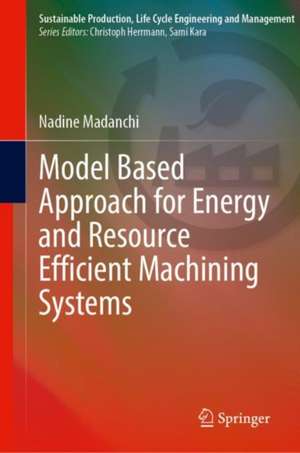Model Based Approach for Energy and Resource Efficient Machining Systems: Sustainable Production, Life Cycle Engineering and Management
Autor Nadine Madanchien Limba Engleză Hardback – 9 noi 2021
Din seria Sustainable Production, Life Cycle Engineering and Management
- 20%
 Preț: 548.77 lei
Preț: 548.77 lei -
 Preț: 428.68 lei
Preț: 428.68 lei - 18%
 Preț: 885.95 lei
Preț: 885.95 lei -
 Preț: 355.31 lei
Preț: 355.31 lei - 15%
 Preț: 645.47 lei
Preț: 645.47 lei - 15%
 Preț: 636.30 lei
Preț: 636.30 lei - 15%
 Preț: 644.63 lei
Preț: 644.63 lei - 18%
 Preț: 1107.73 lei
Preț: 1107.73 lei - 15%
 Preț: 661.65 lei
Preț: 661.65 lei - 15%
 Preț: 641.53 lei
Preț: 641.53 lei - 18%
 Preț: 938.83 lei
Preț: 938.83 lei - 15%
 Preț: 647.73 lei
Preț: 647.73 lei - 18%
 Preț: 938.51 lei
Preț: 938.51 lei - 15%
 Preț: 641.03 lei
Preț: 641.03 lei - 18%
 Preț: 775.96 lei
Preț: 775.96 lei - 15%
 Preț: 636.80 lei
Preț: 636.80 lei - 15%
 Preț: 642.51 lei
Preț: 642.51 lei - 18%
 Preț: 1224.18 lei
Preț: 1224.18 lei - 15%
 Preț: 640.71 lei
Preț: 640.71 lei - 18%
 Preț: 894.16 lei
Preț: 894.16 lei - 15%
 Preț: 596.04 lei
Preț: 596.04 lei - 15%
 Preț: 641.71 lei
Preț: 641.71 lei - 15%
 Preț: 645.28 lei
Preț: 645.28 lei - 18%
 Preț: 950.66 lei
Preț: 950.66 lei - 18%
 Preț: 778.94 lei
Preț: 778.94 lei - 15%
 Preț: 642.36 lei
Preț: 642.36 lei - 15%
 Preț: 639.25 lei
Preț: 639.25 lei - 15%
 Preț: 638.43 lei
Preț: 638.43 lei
Preț: 891.48 lei
Preț vechi: 1087.17 lei
-18% Nou
Puncte Express: 1337
Preț estimativ în valută:
170.61€ • 177.46$ • 140.85£
170.61€ • 177.46$ • 140.85£
Carte tipărită la comandă
Livrare economică 15-29 aprilie
Preluare comenzi: 021 569.72.76
Specificații
ISBN-13: 9783030875398
ISBN-10: 3030875393
Pagini: 177
Ilustrații: XXI, 177 p. 85 illus., 21 illus. in color.
Dimensiuni: 155 x 235 mm
Greutate: 0.46 kg
Ediția:1st ed. 2022
Editura: Springer International Publishing
Colecția Springer
Seria Sustainable Production, Life Cycle Engineering and Management
Locul publicării:Cham, Switzerland
ISBN-10: 3030875393
Pagini: 177
Ilustrații: XXI, 177 p. 85 illus., 21 illus. in color.
Dimensiuni: 155 x 235 mm
Greutate: 0.46 kg
Ediția:1st ed. 2022
Editura: Springer International Publishing
Colecția Springer
Seria Sustainable Production, Life Cycle Engineering and Management
Locul publicării:Cham, Switzerland
Cuprins
Introduction.- Machining Systems and Impact of Cutting Fluids.- State of Research.- Concept Development.- Exemplary Application of the Concept.- Summary, Discussion and Outlook.
Notă biografică
Nadine Madanchi received a master’s degree in mechanical engineering from Technische Universität Braunschweig, Germany, and a master’s degree in systems engineering from the University of Rhode Island, USA. Afterwards, she worked as a research associate at the Institute of Machine Tools and Production Technology as head of the team Eco-efficient Machine Tools and Systems and worked toward her Ph.D. at Technische Universität Braunschweig.
Textul de pe ultima copertă
This book provides a concept to analyze and increase the energy and resource efficiency of machining systems. Machining systems are widely used to produce workpieces in large quantities and with complex geometrical shapes. These systems, however, are also relevant in terms of energy and resource consumption, which is strongly connected to the choice of cutting fluid strategy. Within the focus of the concept, cutting fluid connects the elements of the machining system and results in interactions between them. Based on this description and an extensive literature review, a modeling approach is developed that comprises the relations between process parameters, cutting fluid strategies, and relevant machining system elements. The performance of the machining system is assessed with regard to environmental, economic as well as technological indicators and improved by various organizational and technical measures. The exemplary application of the developed concept is carried out in the context of two case studies and also indicates the corresponding effects of improvement measures.
Caracteristici
Presents a comprehensive approach to analyze and increase the energy and resource efficiency of machining systems Provides specific models for machining system elements that consider the effect of process parameters, cutting fluids Enables the assessment of alternative designs, parameters and strategies from an environmental, economic
